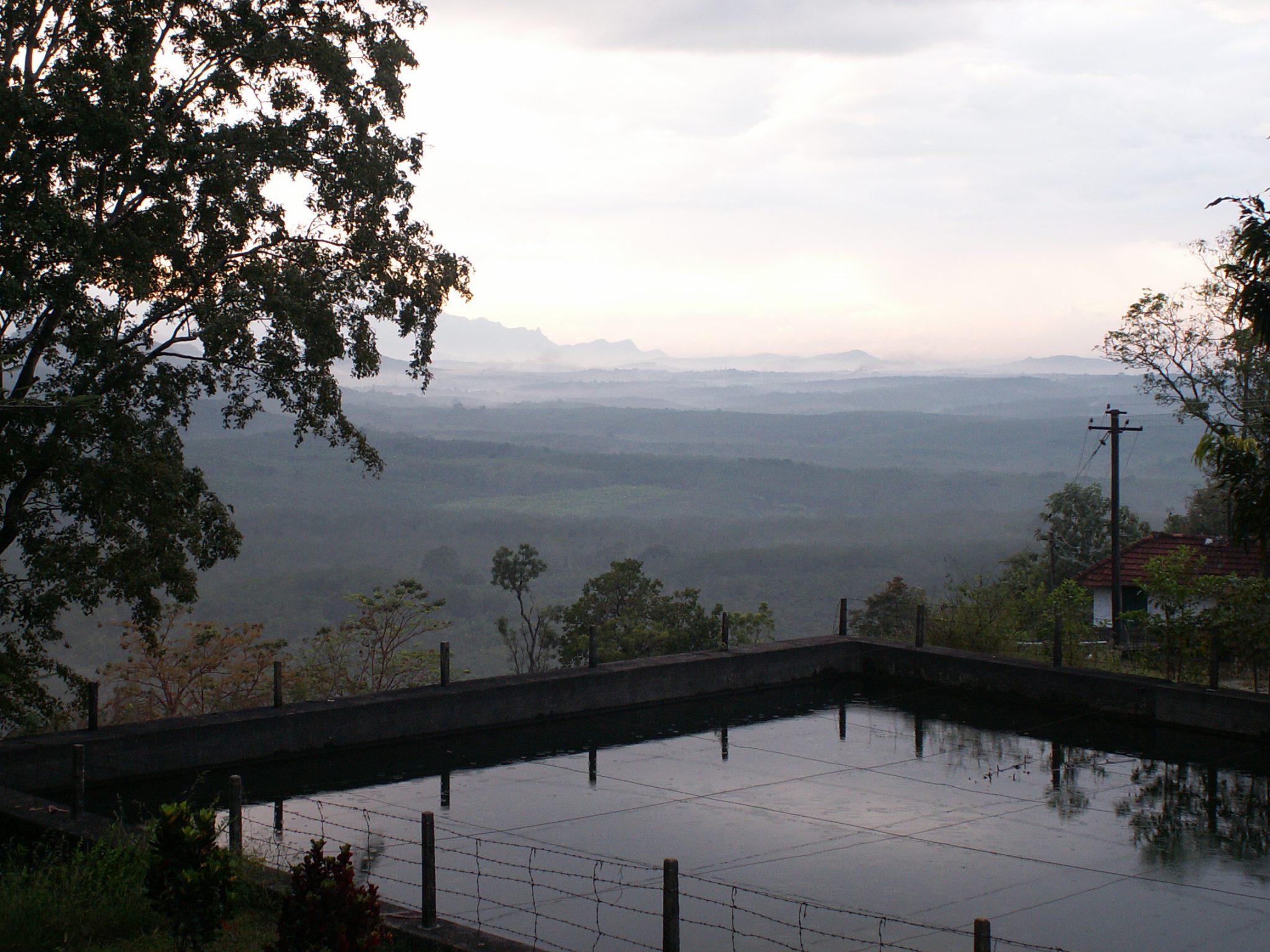Guests were very special in the gardens. There were no guest houses or hotels, so whoever came, stayed with you. Official guests stayed with the General or Group Manager, Manager or Assistant Manager, depending on who they were in terms of their rank or significance for the Company. Your guests stayed with you or sometimes with your friends, depending on what was happening in your life at the time. We played host to a friend’s grandmother, another friend’s heavily pregnant wife as he had to travel urgently and to several others. In the plantations we treated each other as members of our family. We stood behind each other, no question about it. I have written here about a few of the guests. We had many more. Too many to name here. So, if you visited us and are not mentioned in this article, please know that you are remembered though I have not mentioned you here.
Guests were very special firstly, because they were few and far between and because they came from the ‘outside’ world and brought news of what was happening there. Remember I am talking about the period 1983-93. The time before almost everything we know and take for granted today. This was pre-Google, Apple, mobile phones, even TV. Where there was TV, it was Doordarshan. Cable TV didn’t exist in the plantations. In 1985 we saw the first color TV. We had VCRs and VCPs (Video Cassette Recorders and Players) which coupled with the color TV, provided home entertainment to those who were interested in it. Electric typewriters were state-of-the-art and what sat on your lap was not a computer. Cyclostyle was the copying system. Faxes and Xerox machines were still in the distant future. Guests therefore came with real news, even if a few days old; thanks to the time it took for them to get to where we were, high in the mountains and deep in the forest. For those of us in the Anamallais that was close to the truth, because we lived in the middle of the Indira Gandhi National Park on the top of the Anamallai Hills; tea surrounded by thick rainforest, reached after traversing the Aliyar Ghat road with forty hairpin bends. Home to hundreds of species of mammals, birds and reptiles.
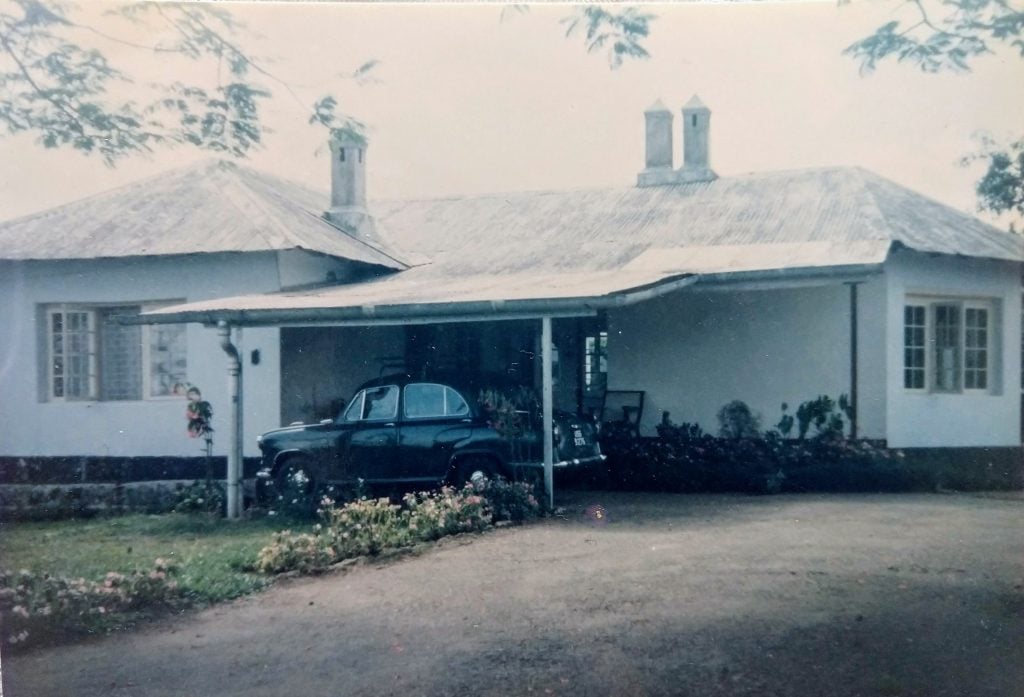
My first guests were Mr. Hasanuddin Ahmed and his wife Anees Fatima (Husnara Aunty), my mother’s cousins. I was delighted to receive them. I was living in No. 18 bungalow; the name given to Assistant Manager’s bungalow in Sheikalmudi Estate, Lower Division which was in Field No. 18. They visited me in 1983, less than 6 months after I had joined planting and I was delighted as they were my favorite uncle and aunt and I was honored that they had come to visit. Bastian, my butler and cook, who you have heard about earlier, put on a great culinary show and everyone was very impressed. One afternoon, after a cup of tea, Hasan Uncle and I were strolling down the path from the bungalow to the main road, when Hasan Uncle told me to explain the whole tea manufacturing process to him. I was very enthusiastic about it as I had just learnt it myself a couple of weeks earlier and I promptly launched into my narrative. “We pluck the top shoots, two leaves and the vegetative bud’, I said. “That is taken to the factory and put into Withering Troughs and air is blown over and through the leaf bed in the trough which removes some of the moisture to make the leaf flaccid. Without withering, they would shatter and crumble when rolled. Then the leaves are put into Rollers in which by an action akin to rubbing tobacco between your palms, tea leaves are rolled to break cell walls and express the juice which coats the small rolled pieces that break off in this process. Rolling is where the process of developing flavor starts. After rolling, the leaves are laid out for several hours, allowing oxidation to take place. This is called Fermentation, though it has nothing to do with fermenting as there is no sugar or production of alcohol as happens in a natural fermentation process. Oxidation is the process in which the oxygen in the air interacts with the now-exposed enzymes in the leaf, turning it a reddish-brown color and changing the chemical composition. The duration of this process depends on the style of tea being produced and the ambient conditions at the time. The final step is to stop the oxidation which is done by what is called Firing. This is done by putting the output from the Rollers into perforated trays and heated air is passed over the trough to dry them to below 3% moisture content which stops the oxidation process and makes the tea black. Good, even drying and low residual moisture enables the tea to keep well, which is necessary for shipping. The tea is packed in plywood boxes lined with paper and film and sealed, ready for shipping.” I stopped to take a breath.
Hasan Uncle listened with great seriousness and attention and said, “You seem to have learnt this all very well. Tell me, what happens if you simply boil green tea leaves?” I was stumped. I didn’t know. But what struck me more than the fact that I didn’t know the answer to his question was that the question had not occurred to me. There I was, working in a tea garden, living in a bungalow surrounded by tea fields and didn’t have the imagination to ask myself a simple question like that. This I what formal education does to one, I guess. Of course, we plucked two or three shoots and boiled them to produce a very ‘green’ chlorophyllic decoction that was hardly drinkable. The point of course was not what it tasted like, but whether I’d had the curiosity to ask the question. Big lesson in my life about the importance of asking the unasked and questioning the ‘accepted’ rule. Hasan Uncle and Husnara Aunty spent a few very enjoyable days with me and left behind memories which are fresh to this day. And I ask questions that nobody thinks of.
While I was the Manager of Lower Sheikalmudi Estate, we got a call to say that the Wrigleys were coming to visit. This was William Wrigley III and William Wrigley IV, the owners of Wrigley Company, the largest chewing gum (Wrigley’s gum) company in the world. On April 28, 2008, Mars announced that it would acquire Wrigley for approximately $23 billion. The Wrigleys were staying with the Group Manager of the Sheikalmudi Group, Mr. S. M. Taher. The managers and assistants from the other estates were invited to dinner to Sheikalmudi bungalow. At the dinner, I suggested that the two Wrigleys, father and son, may like to go down to the Parambikulam Dam through our cardamom plantation in Murugalli. There would be a good chance of seeing bison (Indian Gaur), Malabar Squirrel, Great Malabar Hornbill, Barking Deer and who knows what else. Anamallais and Sheikalmudi in particular, especially that part of it which borders the Parambikulam backwaters, is teeming with wildlife. The plan was to go the next day, late in the afternoon for a swim in the lake and then drive back after dark through the cardamom plantation so that we would have a chance to see some Gaur and other wildlife. It was a nice, dry afternoon and so I had no apprehensions taking the jeep, which didn’t have four-wheel drive, down to the lakeside. Taher bhai drove them down and we all met at Murugalli Bazar and went down to the lakeside.
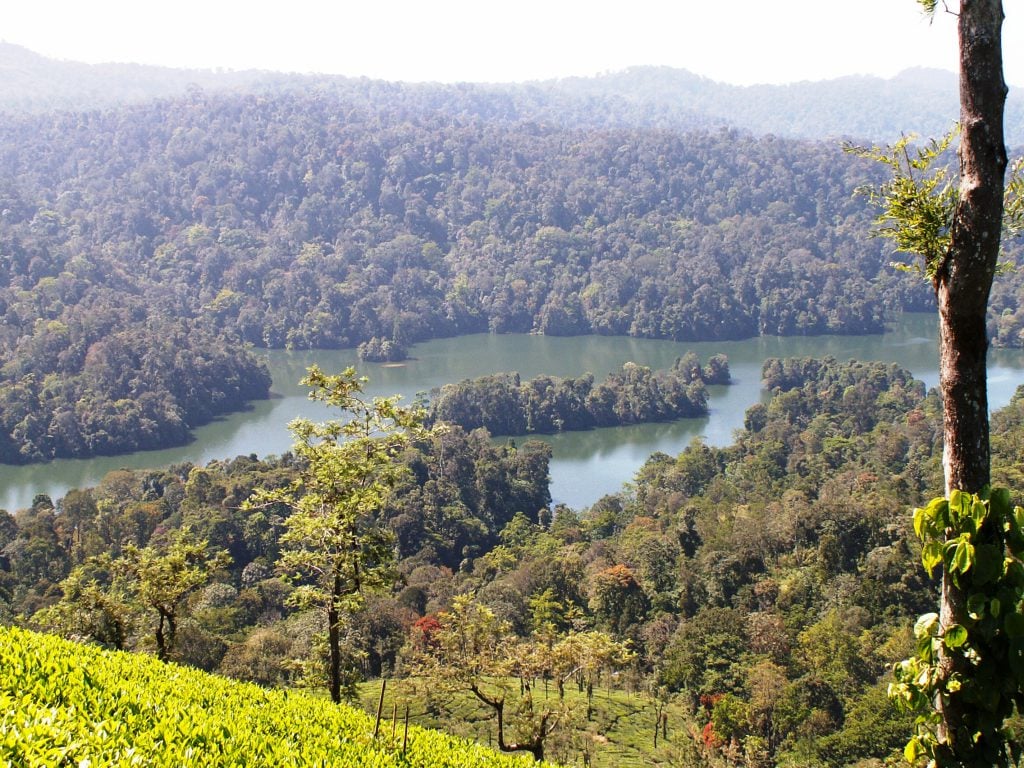
If you walked down the river for a couple of kilometers you would come to the Parambikulam Dam backwaters into which this river flowed. I had built another pool there at the bottom of a waterfall, thanks to a stream that flowed through Murugalli Estate. We used to keep a boat in the dam to go fishing on the lake. There was a thickly wooded island in the lake about half a kilometer from the shore on which one could go and spend the whole day, swimming and lazing in the shade, a very welcome occupation, free from all stress. The only sounds that you would hear would be the wailing call of the Rufus-bellied Hawk Eagle. In the evenings, the Jungle Fowl called the hour. If you stayed beyond sunset, the only danger was that you could encounter bison (Gaur) as you walked home. That encounter was not something to look forward to as I discovered one day. Mercifully, I was walking softly, and the wind was in my face, so the Gaur was as startled as I was. He snorted, spun on his heel, and vanished, crashing through the undergrowth. I was very fortunate.
Everything went according to plan and we swam, ate sandwiches and drank coffee. Raman took the rowboat and Wrigley Jr. to the island in the middle of the lake but returned rather suddenly and very wisely as they found some feral buffaloes which were lying in the water on the other side of the island. These can be very dangerous, and Raman who went as the guide and boatman, insisted that they return. That was a very wise thing to do because we weren’t planning on explaining how we were one Wrigley short when we got back. We watched the sun extinguish itself in the waters of the lake and then when it got dark, we packed our stuff into the jeep and started back. Suddenly it started to rain. In this part of the world, it doesn’t leave you in any doubt, when it rains. It pours. That day, it did with a vengeance. The road quickly became slush and the jeep started skidding. We decided to wait for a bit to see if the rain would ease off. But though we waited for half an hour, nothing happened. We started off once again but realized that we couldn’t all ride in the jeep as the gradient of the road was steep and it was extremely slippery. We all got off and pushed, while Taher bhai drove. It took us over an hour of pushing and driving, to get back to Murugalli Bazar. As the jeep went skidding up the road, it threw up liquid mud in showers. As a result, all of us including our two illustrious guests, were covered with mud from head to toe. But all that I could see was two sets of the brightest teeth this side of the Atlantic. The Wrigleys were great sports and I guess we, all of us had a very good time. Not the way you usually treat billionaires. But these were two very happy billionaires with a strange story to tell.
One day a friend called to say, that a friend of his was visiting India, and could she visit us as she wanted to see a tea garden. Of course, we agreed and sent the car to pick her up from the airport in Coimbatore. Along came Elizabeth Sidney. Elizabeth owned a consulting firm in London, called Mantra Consulting (pronounced Man-tra) and was also a member and office bearer of the Liberal Democratic Party. Elizabeth became a lifelong friend until her death at the age of 86, in 2011.
Elizabeth arrived in the evening as the drive up the Aliyar Ghat from Coimbatore and then across the Anamallais to Lower Sheikalmudi was a full-day affair. At that time, we had another dear friend staying with us, Maaji, Manjit Singh’s grandmother. Manjit was the Manager of Pannimedu Estate of Tata Tea and they had a lockout, so he and his wife Devika went to stay at the Coimbatore Club. But his grandmother came to stay with us. We were very fond of her and she called my wife, ‘Puttar’ (my daughter) and we loved having her with us. Such were the times, when our friends were more than just ‘friends’. Maaji spoke only Punjabi and Elizabeth spoke only English, but they got along famously and had conversations in two completely different languages, much to our amazement. Elizabeth was a wonderfully warm person and we became very good friends and stayed with her in her Islington townhouse twice when we were in London.
The next day I took Elizabeth around the estate to show her tea cultivation and manufacture. She was fascinated that the vast majority of workers were women and she had animated conversations with some of the workers, with me translating from Tamil into English and back. That evening, I suggested that my wife and I with Elizabeth, spend the night in my machan on Manjaparai and see what animals would come to the waterhole. Manjaparai is the flat rock which forms a small flat plateau at the top of the hill, and through which flows a small perennial stream. It is called Majaparai (Yellow Rock) thanks to yellow lichens which cling to it and give it that color. In the summer the sparse grass that sprouts in the monsoon, quickly turns yellow and so the name is justified. I’d had a machan (platform) built on a tree at the edge of the forest overlooking the stream, which empties into a small pool and then goes down the slope into the forest. I had cleared a small pathway to get to the machan tree, but without disturbing the area or its animals. The machan was built in a big fork about three-quarters of the way up the tree at a height of about twenty feet from the ground. It was quite substantial and could comfortably seat four people. From my bungalow to the base of the hill on the top of which the machan was, it was about four kilometers over rough estate roads. Therefore, to make it easy for the ladies and not have them walk the entire distance and then climb the hill (assuming that they would have even agreed to do it), I decided to take them up on a Massey-Ferguson tractor to the base of Manjaparai and walk up the rest of the way. The tractor ride was not the most comfortable, but the novelty of it would hopefully override the discomfort. My wife was not very impressed but for Elizabeth, everything we were doing was a ‘first time in my life’, experience. I drove the tractor with the ladies on either side.
We reached the top, still in one piece and having taken a breather, started up the track leading to the top of the rock. Given that we had the ladies with us, I had sent out a scout, one of my Ramans, to check the pathway and to clear it of any Stinging Nettles (Anaimarti – One which drives away elephants) bushes leaning across the path. His job was also to ensure that the jungle was elephant free. Elephants in the Anamallais are dangerous as they raid vegetable gardens and get driven off by the garden owners beating drums or setting off firecrackers. Elephants hate loud noises and run away but in a foul temper. Not the best frame of mind if you happen to meet them. You always need to be careful of elephants in the Anamallais, thanks to this human-animal conflict. Once we had the all-clear from Raman, we proceeded upwards. We reached the top in time to see the fabulous sunsets that are the prize of climbing Manjaparai. We had some coffee and omelets rolled into parathas and with a coat of lemon pickle, which Bastian had given us as our dinner and then climbed the tree into the machan. As we settled down…Let me tell you this part of the story as my wife recalls it. “Yawar told Elizabeth and me that we were going with him to his machan on Manjaparai. I asked him if it would be cold. He said, ‘Not too much.’ We left on the tractor with him driving and me hanging on one side for dear life being tossed up and down on the rough field roads. Elizabeth was on the other side in the same predicament but seemed to love it. We reached the top of the road in one piece and got off the tractor and started climbing the hill to the top. The view from Manjaparai, of the sun setting, was spectacular and well worth the trouble of getting there.
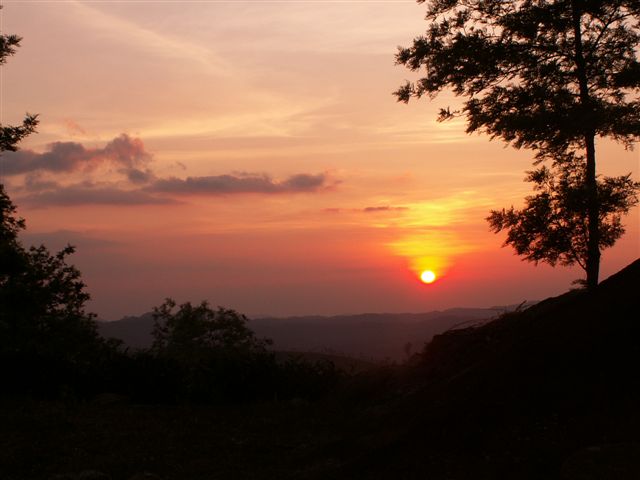
We had a snack and got up into the tree. I am not much of a tree climber, but Raman and his partner had thoughtfully got a ladder which we climbed and scrambled the last few feet to the machan. The ladder was pulled up after us and stashed among the branches above us. Dusk started to fall. Yawar told us to be completely silent and as motionless as possible. He told us that animals see motion before anything else. If you don’t move and your body outline is broken up by our surroundings, you are invisible. Especially as you are sitting high above, you are out of the normal perspective of most animals. The only joker in the pack is the wind. If it blows in your face it means that animals can’t smell you. But it is behind you, then animals will know you are there and will leave. As it started to get dark, a smart wind started coming up the hill in our face. That was good, but it was getting cold. I saw Elizabeth pulling out a sweater from her substantial handbag. Then she pulled out a shawl and wrapped herself in it and sat there, snug as a bug in a rug. Yawar was wearing his waterproof raincoat, which was felt lined and very warm. But there I was in a light sweater because Yawar told me it wouldn’t be so cold. As the night wore on, I got colder and colder and my teeth were chattering so loudly that I am sure that is the reason we didn’t see any animals that night.
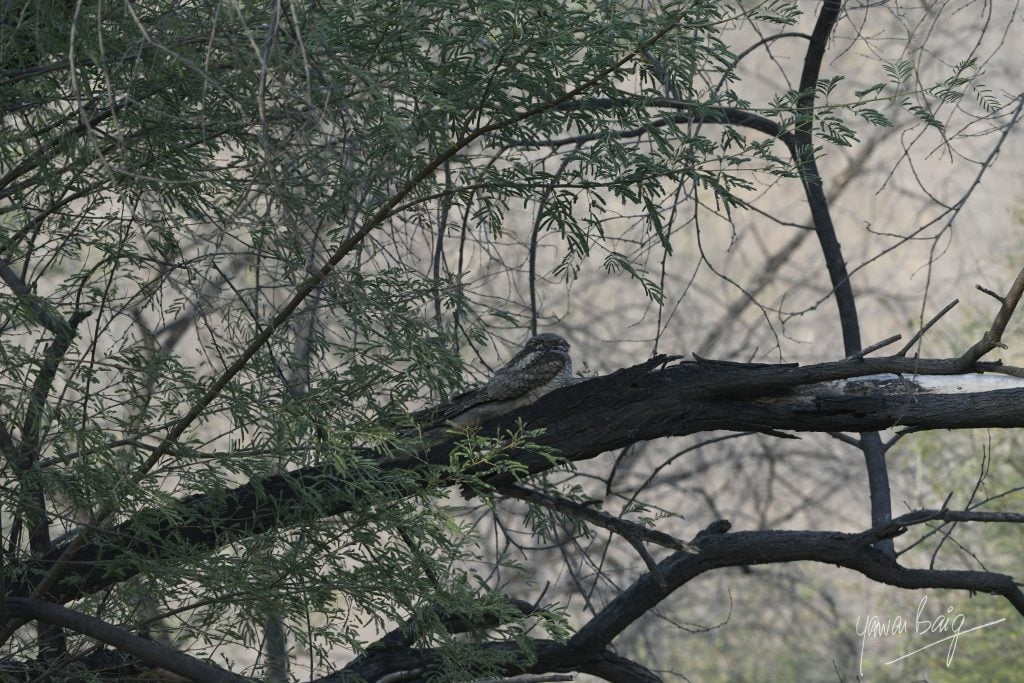
Eventually it got so cold that I simply couldn’t sit in the machan and we all got down onto the rock below and Raman lighted a fire and put on the teapot. The fire was a lifesaver and I can’t tell you how good it felt. There was no question of seeing any animals after the fire had been lighted, but who cares? I was finally warm and out of my misery and that is all I cared about. We sat through the rest of the night, drinking black tea, sweetened with jaggery and listening to the sounds of the forest, which by then had also quietened down. There was the occasional Nightjar which buzzed his call from time to time, but not much else. I told you that the sunset from Manjaparai was spectacular. That was because I had not seen the sunrise. Now I can’t decide which was better. Thankfully I don’t have to pick. I had seen both.”
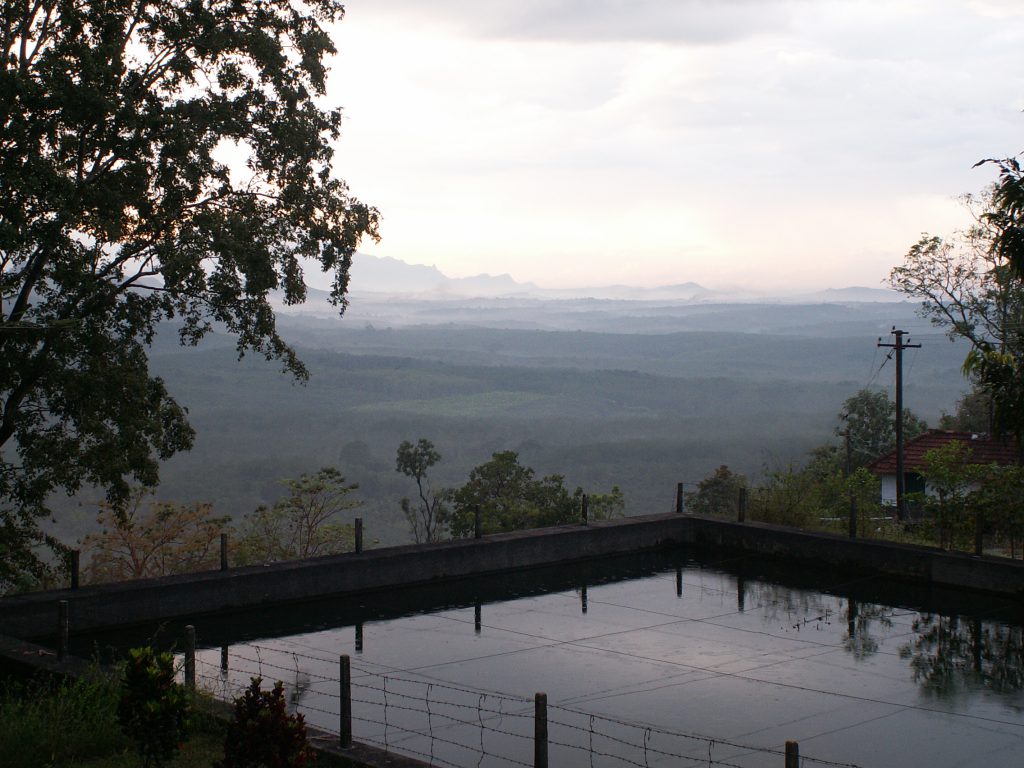
Elizabeth came again when we were in New Ambadi Estate. The Manager’s bungalow had been built by a previous manager called Watts Carter who was one of the best planners and executors of civil works that I have known. His work was his signature and legacy and it was truly remarkable. Rainwater collection tanks that ensured a year-long supply of water in a place were the dry season was 7-8 months long. Beautifully graded and banked roads. Contour planted fields with terraces and water conservation works that ensured that the rubber didn’t suffer in the dry season. This time Elizabeth brought her friend, Margaret Tabor, from Braintree, Essex. Margaret was a delightful lady with lots of interesting stories about her own travels. Margaret lived in her family manor house; we stayed with her once; on a two- thousand-acre estate in Essex where she raised Pheasants and had annual Pheasant shoots. She told us that her main clients were Japanese.
We got a call one day from Ms. Brewty, the Secretary to our General Manager, Mr. N. K. Rawlley. She said, “Mr. Baig, Mr. Rawlley asked me to inform you that there are two ladies from London who are company guests and are staying in Iyerpadi at the guest house. They would like to see some forest area. Could you please help with this?” Forest and me? Of course, I was delighted to help. Next day the ladies arrived in the company jeep and my wife and I met them at the Uralikkal checkpost. Of the two ladies, one was rather large and remarkably well-endowed. The other one looked like she was the counterpoint to the first one, rather like being on Social Security.
We left our car and we all went down the short windy road to the Manamboli Dam. That drive is very productive in terms of wildlife sightings and sure enough we saw Malabar squirrels, Lion-tailed Macaques, and a Barking deer which crossed the road exactly at the place I expected it to……I am convinced that it did this for a living. We stopped for a short break at the bottom of the concrete-surfaced road which ended at the Power Generation House. There was some flow over the sluice gates of the dam, and it was very relaxing to listen to the sound of flowing water. Then we started down the unpaved forest road to Topslip. This road runs along the Manamboli river. As we rounded a bend, I recalled an incident when my dearest friend Berty and I were fishing at the foot of the rapids on the other side of the dam. We would stand in rapidly flowing water in Manamboli below the sluice gates and cast for Mahseer while drinking in the atmosphere of the jungle. Not a sound except from the river or from a bird celebrating its life.
One day we were fishing in our usual spot, when one of the fish we had caught disappeared. “Dai Baig Dorai, you can’t tie a bloody fish properly man!!” yelled my dear friend. We had each caught a good sized Mahseer. His was still there. Mine had disappeared. What gave the game away was that the line looked like it had been bitten through. Just then I heard the whistles….two otters talking to one another, no doubt with evil intentions on Berty’s fish. I called out to him in a low voice, “Yedo, noke awaday” and I pointed to the otters. Berty laughed so much that he almost fell into the water. “What the bloody hell, so this is the bugger who stole our fish!!! Man, what do you expect? We go into their home and steal their fish, so they decide to freeload on our effort.” What memories!! But my friend is gone. So would have the otters. Nothing lives that long in the forest. Only I am alive to tell the tale and to remember my friend and to live once again that one magical day, this time on behalf of both of us.
On this road, one thing to watch out for, was elephants. It was a narrow road with very thick, almost impenetrable forest on one side the river on the other. Not the best place to come face to face with elephants. Mercifully, elephants are wiser than we are and when they hear a vehicle coming their way, they move off into the jungle and you won’t even see them. We didn’t meet any until we got to the Forest Department’s elephant camp. This was where they kept their elephants used for logging and other forest related activity. We took a break for coffee and our standard omelet/paratha snack and looked around the camp. The head mahawat (elephant caretaker) met us and explained what they did in the camp. I asked him if he would be kind enough to give a short ride on one of the elephants to our guests. There was a huge, very black bull elephant which was tethered at one end of the line. I asked the mahawat if we could ride him.
The mahawat didn’t look very happy about this but agreed and went off to get a couple of gunny sacks. He got the elephant to kneel and climbed up on his knee and holding his ear, he pulled himself up on his neck. Then he asked me to climb on. I did the same and settled astride behind him. Not easy at all as elephants have a very prominent backbone with protruding vertebrae. When you sit astride, you are in imminent danger of doing permanent damage to your ability to continue your line of descendants. That is why when you ride elephants in our wildlife reserves, they saddle them with very thick mattresses or have a howda in which you sit much like sitting on a sofa. But we were in a working camp. They didn’t have these luxuries. The mahawat was sitting on the neck, where the vertebrae don’t protrude and he has his gunny sack cushion under him. But the ‘passenger’ was on his own. The mahawat called out his order and the elephant stood up. If you have ever seen an elephant standing up from a kneeling position, you will know what happens. It is as close to being on the bow of a ship in a storm as you are likely to be on dry land. I knew what was coming and braced myself and remained atop the huge animal without mishap. The mahawat took us for a short walk-around in the forest and we returned to the camp.
Next was the turn of our guests. The Social Security one declined the opportunity but the well-endowed one was keen to go. She tried to climb up on the elephant’s knee as if it was a staircase and slipped. The mahawat, spontaneously reached to take her hand to save the British Empire from an ignominious landing in the dirt almost unseating himself in the process. Eventually the lady managed to get astride the neck of the elephant. The expression on her face when she sat there, spoke volumes of what she must have encountered, but some things can’t be spoken aloud and so she suffered in silence. Then the mahawat shouted his order to the elephant and the animal lurched forward to get up. The lady fell forward on top of the mahawat and as the elephant lurched backwards straightening his forelegs, she was thrown back and grabbed the mahawat in a bear hug. The man disappeared into the British Empire, overwhelmed but not without a plaintive cry for help, “Ayyaaaaaa!!” The elephant took them for another short ride in the forest and then returned and we had a repeat performance of lurching, grabbing and plaintive cry. A memory that refuses to go away. The elephant, however, was not amused. It started rumbling and the mahawat told us that he didn’t want to chance another ride. Elephants are very patient and tolerant but are never really domesticated. They have an uneasy relationship of cooperation with humans, which can break if you push their patience beyond their tolerance. I understood the mahawat’s reluctance and agreed. Such was our entertainment in the plantations. Each day was a surprise and welcome.
One day in 1990/91, Mr. Rawlley called me and said, “Yawar, you are getting a visitor, Mr. Mark Bostock from Colombo. He is British and lives between England and Colombo where he used to be the Chairman of John Keells. He is a very interesting person and someone you can learn a lot from.” Before I go on, here is a link to an article about Mark Bostock in ‘The Island’, from Colombo. http://island.lk/index.php?page_cat=article-details&page=article-details&code_title=154197
In Ambadi there was no guest house so he stayed with us like all our guests. The question was food, because all the English people we know, eat little or no chillies, while South Indian food tends to be hot. In Ambadi we had an excellent cook, Perumal, who made the best Upma, Dosai and Idlies in the world, but had nothing Western in his repertoire. My wife decided that she would make a classic English Roast Lamb, with mashed potatoes, boiled vegetables and gravy. You can hardly get more British than that. We didn’t want the man to get the runs the day he arrived because the food was too hot. I love Roast Lamb and agreed wholeheartedly. Mark duly arrived, driven in from Trivandrum, looking very red and sweaty, as we didn’t have an airconditioned car at that time. He told me, “Please call me Mark”, when I welcomed him as Mr. Bostock. So, Mark he was. After he had showered, we sat down to dinner. The Roast Lamb was spectacular, and I loved it. Mark also started with enthusiasm but gradually slowed down. I noticed this and asked, “Mark, is everything alright? Can I get you something?”
He said, “I don’t want to be impolite, but do you have any pickle?”
My eyebrows shot up in astonishment. “There is pickle, but it is very hot”, I said.
“Yes, can I have it please?” The pickle was brought. I was blood red, made of mangoes marinated in fire and was totally delicious if you liked to have the top of your head raising up periodically to let out the steam from your boiling brains. I gingerly slid the bottle towards Mark, debating whether I should get him to sign an Indemnity Declaration absolving me of responsibility for his expiry in flames after consuming the pickle. But to my great astonishment, he took a huge helping of it and ate it with the roast mutton (no injury intended to British sentiments or honor) with great relish. He apologized to my wife and said, “The roast is delicious, but you see, I am from Ceylon. I need chilly in my food.” So, there he would be, at lunch and dinner, eating pickles of various kinds, his face the color of the pickle but thoroughly enjoying himself. He was not ‘from Ceylon’, but had lived there for so long that his palate was totally Sri Lankan.
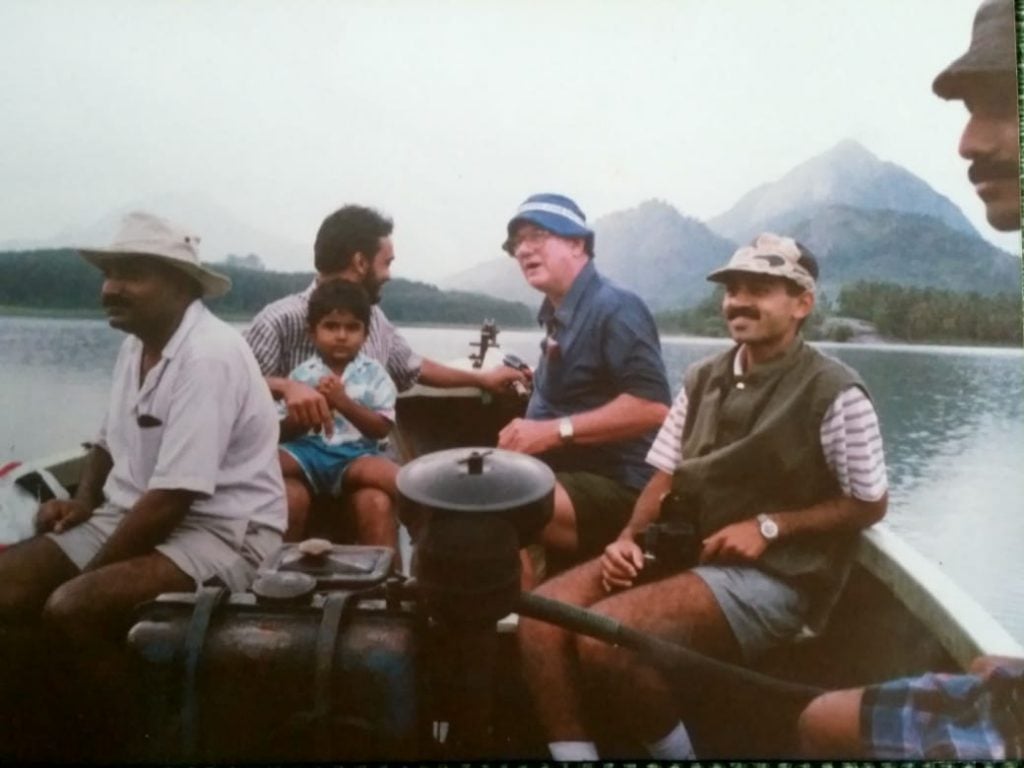
Next morning, I took Mark on a tour of the estate and factory. As we walked in the rubber drying sheds in which crêpe rubber sheets are dried, Mark said to me, “If there was a way to dry these evenly in controlled conditions, that would give us much better prices.” Having come to Ambadi from tea, I spontaneously said, “I think if we get a couple of withering fans from one of our tea factories and install them at one end of this shed, that will do the trick. He turned and looked at me intently and said, “What the hell! That sounds like a very good idea. I wonder why nobody ever thought of that before?” As soon as we got back to the office, I asked for three withering fans which arrived in due course. These are low RPM fans with large blades that can be used to blow or draw air without causing too much turbulence. You want the air to move over the crêpe rubber sheets without blowing them about. We installed the fans and changed the way rubber is processed.
Mr. Mark Bostock visited us several times between 1990 and 1993 when I was the Manager of New Ambadi Estate. What impressed me very much about him was how inquisitive and open to learning he was. We would go for rides in our boat on the lake that bordered the estate. He would accompany me every day when I went on my rounds of the estate and greatly appreciated the rapport that I had with the workers and unions. He understood Tamil, so he had a good idea of what was happening when he was witness to any interactions. Though he had retired in 1986, having built a conglomerate, John Keells, in Sri Lanka, there was not a grain of arrogance or even formality in him. He was easy going, very friendly, open to all new ideas, full of questions and would listen very carefully to the answers. We would spend the days in the estate and factory and the evenings, talking about anything under the moon, that came to mind. Like Nickoo said, I learnt a lot from Mark, but the best thing out of all that was the value of an open mind and the willingness to learn from anyone. I can safely say that I have never come across anyone as open to learning as Mark Bostock. I wish I had more time with him. I was very sorry to learn that in 2000 he died in Sri Lanka, in a freak accident as the rafters under his chair collapsed and he crashed through to the stone floor below. He didn’t survive the injuries. As the song goes:
Those were the days my friend
We thought they’d never end
We’d sing and dance forever and a day
We’d live the life we choose
We’d fight and never lose
For we were young and sure to have our way
